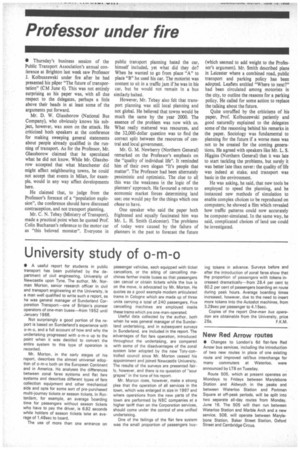Professor under fire
Page 42

If you've noticed an error in this article please click here to report it so we can fix it.
• Thursday's business session of the Public Transport Association's annual conference at Brighton last week saw Professor J. Kolbuszewski under fire after he had presented his paper "The future of transportation" (CM June 6). This was not entirely surprising as his paper was, with all due respect to the delegates. perhaps a little above their heads in at least some of the arguments put forward.
Mr. D. W. Glassborow (National Bus Company), who obviously knows his subject, however, was soon on the attack. He criticized both speakers at the conference for making sweeping general statements about people already qualified in the running of transport. As for the Professor, Mr. Glassborow claimed that he speculated what he did not know. While Mr. Glassborow accepted that what Manchester did might affect neighbouring towns, he could not accept that events in Milan, for example. would in any way affect developments here.
He claimed that, to judge from the Professor's forecast of a -population explosion", the conference should have discussed contraception, and not transport planning.
Mr. C. N. Tebay (Ministry of Transport), made a practical point when he quoted Prof. Colin Buchanan's reference to the motor car as -this beloved monster". Everyone in public transport planning hated the car, himself included, yet what did they do? When he wanted to go from place "A" to place "B" he used his car. The motorist was content to sit in a traffic jam if he was in his car. but he would not remain in a bus similarly halted.
However. Mr. Tebay also felt that transport planning was still local planning and not global. He believed that towns would be much the same by the year 2000. The essence of the problem was now with us. What really mattered was resources, and the 32,000-dollar question was to find the correct split between the resources of central and local government.
Mr. G. M. Newberry (Northern General) remarked on the Professor's emphasis on the "quality of individual life". It reminded him of their own slogan "It's people that matter". The Professor had been alternately pessimistic and optimistic. The clue to all this was the weakness in the logic of the planners' approach. He favoured a return to economic market forces determining land use; one would pay for the things which one chose to have.
One speaker who said the paper both frightened and equally fascinated him was Mr. L. H. Smith (Leicester). The problems of today were caused by the failure of planners in the past to forecast the future
(which seemed to add weight to the Professor's argument). Mr. Smith described plans in Leicester where a combined road, public transport and parking policy has been adopted. Leaflets entitled "Where to next?" had been circulated among motorists in the city, to outline the reasons for a parking policy. He called for some action to replace the talking about the future.
Quite unruffled by the criticisms of his paper, Prof. Kolbuszewski patiently and good naturedly explained to the delegates some of the reasoning behind his remarks in the paper. Sociology was fundamental to planning for the future if a worse mess was not to be created for the coming generations. He agreed with speakers like Mr. L. S. Higgins (Northern General) that it was late to start tackling the problems, but surely it was better late than never: the quality of life was indeed at stake, and transport was basic in the environment.
He was asking, he said, that new tools be employed to speed the planning, and he instanced new methods of simulation to enable complex choices to be reproduced on computers; he showed a film which revealed how traffic patterns could now accurately be computer-simulated. In the same way, he said, complicated choices of land use could be investigated.
























































































































































